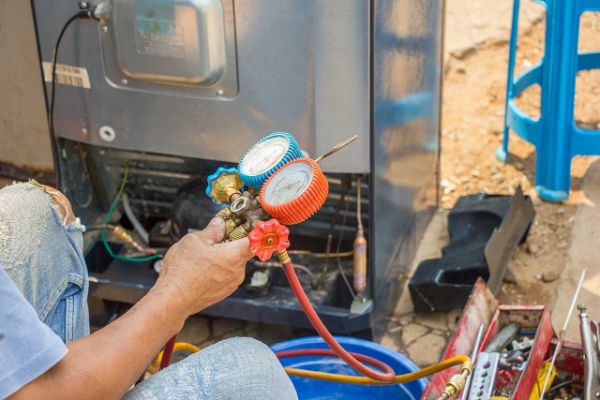When it comes to air conditioning and refrigeration systems, the terms “refrigerant” and “Freon” are often used interchangeably. However, it’s important to understand that there are significant differences between the two.
In this blog post, we will talk about the distinctions between refrigerant and Freon, their purposes, and the importance of proper usage in cooling systems.
Table of Contents
Definition and Composition
Refrigerant: Refrigerant is a general term used to describe substances used in cooling systems that undergo a phase change from gas to liquid and vice versa. These substances absorb heat from the environment and release it elsewhere, facilitating the cooling process. Common refrigerants include hydrofluorocarbons (HFCs), hydrochlorofluorocarbons (HCFCs), and natural refrigerants like ammonia and carbon dioxide.
Freon: Freon is a specific brand name of refrigerants developed by the DuPont company. It refers to a group of chlorofluorocarbons (CFCs) and hydrochlorofluorocarbons (HCFCs) that were widely used in older cooling systems. However, due to their harmful impact on the ozone layer, many countries have phased out the production and use of Freon.
Environmental Impact
Refrigerant: Modern refrigerants, such as HFCs, have been developed as alternatives to older refrigerants like Freon. These newer refrigerants have a lower impact on the ozone layer and are referred to as ozone-friendly or ozone-safe. However, some HFCs have a high global warming potential (GWP), contributing to climate change. As a result, there is a growing shift toward the use of natural refrigerants that have minimal environmental impact.
Freon: Freon, particularly CFCs, played a significant role in depleting the ozone layer. The chlorine atoms present in CFCs were found to break down ozone molecules, leading to the formation of the ozone hole. Recognizing this environmental impact, the production and use of Freon have been largely phased out worldwide.
Safety Considerations
Refrigerant: When handling refrigerants, safety precautions must be followed to prevent harm. Refrigerants are generally considered safe when used and handled correctly. However, some refrigerants can be toxic or flammable. It is essential to adhere to safety guidelines, wear protective equipment, and have proper training when working with refrigerants.
Freon: Freon, specifically CFCs, poses significant health and environmental risks. Inhalation of Freon gases can cause respiratory issues, dizziness, and even asphyxiation in extreme cases. Moreover, the release of CFCs into the atmosphere contributes to ozone depletion and global warming.
Regulatory Standards and Compliance
Refrigerant: The use and regulation of refrigerants vary by country and region. Various international agreements, such as the Montreal Protocol, aim to phase out ozone-depleting substances and promote the adoption of environmentally friendly alternatives. Compliance with local regulations, including proper handling, storage, and disposal of refrigerants, is crucial to minimize environmental impact.
Freon: Due to the environmental concerns associated with Freon, the production and use of CFCs have been restricted or banned globally. Most cooling systems now rely on alternative refrigerants that are less harmful to the ozone layer.
Retrofitting and System Compatibility
Refrigerant: Upgrading older cooling systems to use environmentally friendly refrigerants often requires retrofitting or replacing specific components. System compatibility is a crucial consideration when transitioning to alternative refrigerants. Consultation with a qualified HVAC professional is necessary to ensure compatibility and proper system performance.
Freon: If you have an older cooling system that still uses Freon, it is important to consider the implications. As mentioned earlier, the production and use of Freon have been phased out due to environmental concerns. This means that obtaining Freon for your system may become increasingly difficult and costly over time. Additionally, using an outdated system that relies on Freon can contribute to environmental harm and may not meet current energy efficiency standards.
It is recommended to consult with an HVAC specialist to assess the feasibility of retrofitting or replacing your system with one that uses modern, environmentally friendly refrigerants. They can guide you through the process, ensuring compliance with regulations and maximizing the efficiency and performance of your cooling system.
In conclusion, understanding the differences between refrigerant and Freon is crucial for making informed decisions regarding your cooling systems. While refrigerant is a broad term that encompasses various substances used in cooling, Freon specifically refers to a group of CFCs and HCFCs.
Due to their harmful impact on the ozone layer, the production and use of Freon have been phased out globally. It is essential to prioritize the use of ozone-friendly refrigerants and comply with safety regulations to minimize environmental harm and ensure the efficiency and longevity of your cooling systems.
Remember, always consult with a qualified HVAC professional for specific advice and guidance tailored to your system’s needs.

